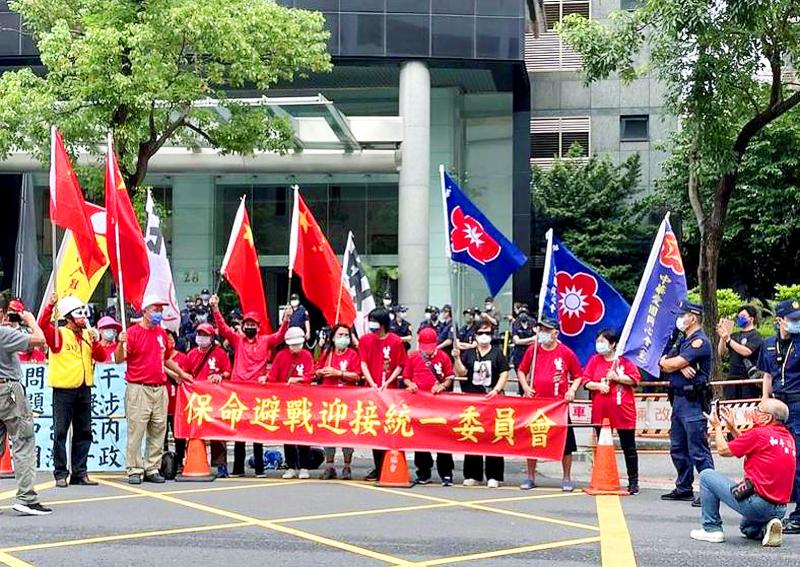A national security official earlier this week warned of Beijing’s “trifecta” strategy of intimidating other countries, after Japan was rebuked for reportedly planning to station an active-duty defense attache at the Japan-Taiwan Exchange Association over the summer.
The Sankei Shimbun on June 4 reported that the Japanese Ministry of Defense was for the first time considering dispatching a serving civilian rather than a retired official to the association amid intensifying Chinese pressure in the Taiwan Strait.
Tokyo has traditionally sent a retired military officer to serve as an unofficial liaison at the association, the newspaper said.

Photo courtesy of a reader
Although Tokyo declined to comment officially on the matter, Japanese Minister of Defense Nobuo Kishi shared the report on Facebook in what has been interpreted as passive confirmation.
Chinese Central Foreign Affairs Commission Director Yang Jiechi (楊潔篪) on June 7 called Japanese National Security Secretariat Director-General Takeo Akiba.
“Old and new issues are intertwined in China-Japan relations, and difficulties and challenges cannot be ignored,” a Chinese ministry statement quoted Yang as saying during the call.
The Chinese state-run Global Times on the same day ran an editorial urging Beijing to “give Japan a blow to the head to wake it up” over its rumored “rupture” of existing post-World War II diplomatic arrangements with Taiwan.
The newspaper followed that up with another editorial accusing the association of making “small moves” over its 50-year history “carefully calculated to test China’s bottom line.”
Listing its supposed “crimes,” the article gave the association’s address in Taipei and included a photograph of the representative’s business card with a red “X” over his title of “ambassador.”
It also said that “whenever someone on the island expresses discontent with Japan, the association becomes an outlet for their anger.”
A group of Taiwanese unification supporters the next day gathered in front of the association’s office carrying banners protesting Tokyo’s “interference in internal affairs.”
The three events — the call to the Japanese minister, the editorials and the protest — were orchestrated to put pressure on Japan, a national security official said on condition of anonymity.
Yang threatened Tokyo in the phone call, which was cited in a Global Times article maligning the association, they said.
Protesters followed the article’s instruction to organize a “coincidental protest,” incited by the newspaper’s “inflammatory language,” the person added.
Chinese harassment of foreign diplomatic missions is nothing new, the official said, citing another case from earlier this month in which a post promoted on Chinese social media allegedly quoted two US diplomats in Guangzhou as saying that the “hype” around human rights abuses in Xinjiang was “fabricated.”

SHIPS, TRAINS AND AUTOMOBILES: The ministry has announced changes to varied transportation industries taking effect soon, with a number of effects for passengers Beginning next month, the post office is canceling signature upon delivery and written inquiry services for international registered small packets in accordance with the new policy of the Universal Postal Union, the Ministry of Transportation and Communications said yesterday. The new policy does not apply to packets that are to be delivered to China, the ministry said. Senders of international registered small packets would receive a NT$10 rebate on postage if the packets are sent from Jan. 1 to March 31, it added. The ministry said that three other policies are also scheduled to take effect next month. International cruise ship operators

HORROR STORIES: One victim recounted not realizing they had been stabbed and seeing people bleeding, while another recalled breaking down in tears after fleeing A man on Friday died after he tried to fight the knife-wielding suspect who went on a stabbing spree near two of Taipei’s busiest metro stations, Taipei Mayor Chiang Wan-an (蔣萬安) said. The 57-year-old man, identified by his family name, Yu (余), encountered the suspect at Exit M7 of Taipei Main Station and immediately tried to stop him, but was fatally wounded and later died, Chiang said, calling the incident “heartbreaking.” Yu’s family would receive at least NT$5 million (US$158,584) in compensation through the Taipei Rapid Transit Corp’s (TRTC) insurance coverage, he said after convening an emergency security response meeting yesterday morning. National

PLANNED: The suspect visited the crime scene before the killings, seeking information on how to access the roof, and had extensively researched a 2014 stabbing incident The suspect in a stabbing attack that killed three people and injured 11 in Taipei on Friday had planned the assault and set fires at other locations earlier in the day, law enforcement officials said yesterday. National Police Agency (NPA) Director-General Chang Jung-hsin (張榮興) said the suspect, a 27-year-old man named Chang Wen (張文), began the attacks at 3:40pm, first setting off smoke bombs on a road, damaging cars and motorbikes. Earlier, Chang Wen set fire to a rental room where he was staying on Gongyuan Road in Zhongzheng District (中正), Chang Jung-hsin said. The suspect later threw smoke grenades near two exits

The Forestry and Nature Conservation Agency yesterday launched a gift box to market honey “certified by a Formosan black bear” in appreciation of a beekeeper’s amicable interaction with a honey-thieving bear. Beekeeper Chih Ming-chen (池明鎮) in January inspected his bee farm in Hualien County’s Jhuosi Township (卓溪) and found that more than 20 beehives had been destroyed and many hives were eaten, with bear droppings and paw prints near the destroyed hives, the agency said. Chih returned to the farm to move the remaining beehives away that evening when he encountered a Formosan black bear only 20m away, the agency said. The bear